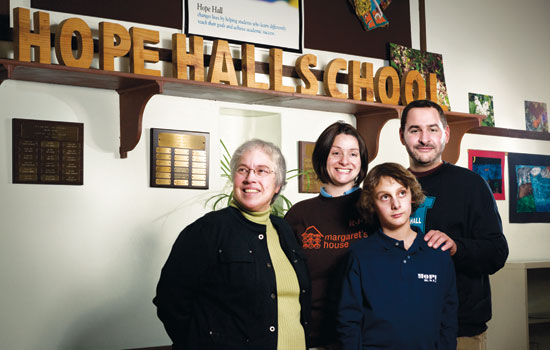Poster families have RIT connections
Will Strawser
Hope Hall has made a difference for Becky and David Corcimiglia, and their son, Gian.
Sometimes hearing the news isn’t easy: A doctor reveals you have breast cancer, or a teacher says your child is uncontrollable in the classroom.
Two brave RIT families—whose faces you’ll be seeing on the posters around campus for RIT’s 2009 United Way Campaign—have decided to share their personal and poignant experiences. Both have benefited tremendously from contributors of two United Way of Greater Rochester donor designated agencies: The Breast Cancer Coalition of Rochester and Hope Hall School.
Ninety-eight is a lucky number for Becky Simmons because it’s her survival rate after being diagnosed with breast cancer last spring.
“As someone who does constant research,” explains the RIT archivist, “I wanted to know everything about my disease to make up my mind about surgery and treatment.”
Simmons found the Breast Cancer Coalition of Rochester, a donor-designated agency of United Way, to be an excellent source for information. She saw the coalition’s brochure during her mammogram office visit—and the organization was also recommended by her physician, as well as a friend who had used its services.
“The director, Holly Anderson, is an awesome woman who spent an hour with me discussing Breast Cancer 101 and sent me home with a thick book and a DVD from their library.”
The relationship didn’t stop there. Simmons attended free yoga classes at the facility to lift her spirits, became involved with “brown bag” group discussions for survivors and the newly diagnosed, and is now volunteering as a Peer Advocate Lending Support Pal.
“It’s been a rough year but I know I’m not alone,” Simmons says. “I’ve gotten so much support from my husband and family, Breast Cancer Coalition professionals, and RIT friends who constantly affirmed, ‘We’re behind you, we’re with you, we love you.’”
For another RIT family, concern involved their son, diagnosed with Tourette Syndrome, who was experiencing frustration and failure in a traditional educational setting.
It became noticeable at day one—Gian just didn’t fit in with the rest of his classmates. Born two months premature, he had a normal IQ but his hyperactivity, phonic tics and odd, repetitive behavior patterns caused him to be penalized, separated and ostracized at the school he attended.
“His cognitive skills are there, but there’s a constant misfiring in his brain,” says his mother, Becky Corcimiglia, an associate teacher at Margaret’s House Child Care Center at RIT. “The teachers didn’t know how to deal with his unusual behaviors and his head would hang down low from constant feelings of failure and rejection—he didn’t have one friend.”
Advocating a change for their son, Becky and her husband, David, felt “blessed and relieved” when Gian was accepted into third grade at Hope Hall School in Gates, a donor-designated agency of United Way.
Sister Diana Dolce, principal and founder of Hope Hall, which was established in 1994, applies a holistic approach to education. The mission of the school is to provide an opportunity for “at-risk” or “educationally stranded” children to become successful lifelong learners.
“Every student in grades three to nine at Hope Hall learns differently; lessons are broken down into smaller pieces so they can keep up with the pace,” says Dolce. “Through the generosity of supporters of United Way of Greater Rochester, Hope Hall is able to stretch its shoestring operating budget and give students the education they deserve.”
And the best part is . . . “Gian runs to the bus; he’s now 11, in the sixth grade and holds his head high.”
Web extra: Hear an interview with Becky Corcimiglia and Becky Simmons on the RIT news podcast “Studio 86”.














